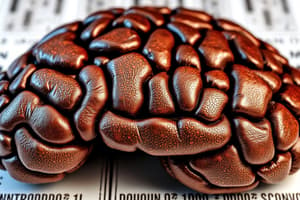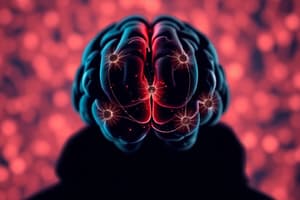Podcast
Questions and Answers
What does 'modality-specific' describe regarding the coding of the sensory register?
What does 'modality-specific' describe regarding the coding of the sensory register?
- It depends on the sensory organ involved in receiving the information. (correct)
- It relates to the distinctiveness of the information being processed.
- It refers to information coded for long-term storage.
- It is specific to the individual's emotional state during encoding.
Which of the following best describes the capacity of the sensory register?
Which of the following best describes the capacity of the sensory register?
- Very large, possibly unlimited. (correct)
- Approximately 18-30 seconds worth of sensory input.
- Limited to the amount of information that can be rehearsed in 2 seconds.
- Around seven plus or minus two chunks of information.
In Baddeley's study on coding in short-term memory, which type of word list presented the most difficulty for participants to recall?
In Baddeley's study on coding in short-term memory, which type of word list presented the most difficulty for participants to recall?
- Semantically similar words.
- Acoustically dissimilar words.
- Acoustically similar words. (correct)
- Visually similar words.
Which type of long-term memory is generally considered to be the MOST resilient to forgetting or the effects of brain damage??
Which type of long-term memory is generally considered to be the MOST resilient to forgetting or the effects of brain damage??
Clive Wearing suffered extensive brain damage that resulted in a profound inability to form new memories and a significant loss of old memories. Which type of amnesia did he experience?
Clive Wearing suffered extensive brain damage that resulted in a profound inability to form new memories and a significant loss of old memories. Which type of amnesia did he experience?
Overton's state-dependent learning research demonstrated that recall is improved when an individual's internal state during learning matches their internal state during retrieval. Which of the following conditions would result in the BEST recall performance?
Overton's state-dependent learning research demonstrated that recall is improved when an individual's internal state during learning matches their internal state during retrieval. Which of the following conditions would result in the BEST recall performance?
In Tulving and Pearlstone’s study on cue-dependent forgetting, what experimental condition resulted in significantly improved recall performance compared to another?
In Tulving and Pearlstone’s study on cue-dependent forgetting, what experimental condition resulted in significantly improved recall performance compared to another?
Which of the following is NOT typically identified as a limitation or criticism of interference theory and cue-dependent forgetting as explanations for forgetting?
Which of the following is NOT typically identified as a limitation or criticism of interference theory and cue-dependent forgetting as explanations for forgetting?
Flashcards
Modality-Specific Coding
Modality-Specific Coding
Coding that depends on the sensory organ (e.g., visual, auditory).
Sensory Register Capacity
Sensory Register Capacity
The sensory register has a very large, possibly unlimited, capacity for storing sensory information.
Baddeley's Coding Study: STM
Baddeley's Coding Study: STM
Acoustically similar words (words that sound alike) were more difficult to recall in short-term memory due to acoustic confusion.
Most Resistant LTM
Most Resistant LTM
Signup and view all the flashcards
Clive Wearing's Amnesia
Clive Wearing's Amnesia
Signup and view all the flashcards
State-Dependent Retrieval
State-Dependent Retrieval
Signup and view all the flashcards
Categorized Recall
Categorized Recall
Signup and view all the flashcards
Anxiety and Recall
Anxiety and Recall
Signup and view all the flashcards
Study Notes
- Modality-specific in sensory register coding means it relies on the specific sensory organ involved.
- The sensory register has a very large, possibly unlimited capacity.
- Acoustically similar words were the most difficult to recall in the short-term memory condition in Baddeley's study on coding.
- Procedural long-term memory is most resistant to forgetting.
- Clive Wearing experienced both retrograde and anterograde amnesia due to brain damage.
- Recall was best in Overton's research when information was learned in the same state.
- Categorised recall resulted in significantly better recall in Tulving and Pearlstone's research.
- Interference theory and cue-dependent forgetting have practical applications.
- In Yuille and Cutshall's study, witnesses closest to the shooter (high anxiety) had the best recall.
- 71% of participants included items they hadn't seen in Gabbert's study.
- Kohnken's meta-analysis of cognitive interviews revealed the interview increased accurate information and more.
- Detectives gained 47% more information after cognitive interview training, according to Fisher.
Studying That Suits You
Use AI to generate personalized quizzes and flashcards to suit your learning preferences.




